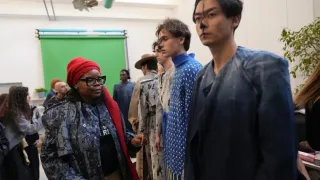November 18, 2017
MTT: VIP
Philip Campbell READ TIME: 4 MIN.
San Francisco Symphony Music Director Michael Tilson Thomas, more simply and famously known as MTT, recently announced the end of his illustrious tenure with the treasured organization. He is stepping down in June 2020 at the end of the 2019-20 season, marking both his 75th birthday and 25th year at the helm. The news sends shock waves throughout the tight-knit community of Northern California music-makers and devoted fans, but it is hardly surprising after so many award-winning and innovative years leading the great orchestra.
Aside from a personal feeling that it is time to "set aside some of my administrative responsibilities and begin a new period of creative possibilities," MTT likes the roundness of the numbers of his upcoming milestones, and also the exciting potential offered by his future assumption of the newly created title of Music Director Laureate of the San Francisco Symphony.
He won't be going far away to leave his heart in San Francisco. MTT is a native Californian, and his decades-old roots in the Bay Area are set too deep. He has made a living-legend success of his years with the SFS, and the mutual admiration society is scheduled to go on indefinitely. We will save longer and more detailed testimonials for the next couple of years. MTT has still got a lot of active ground to cover, and we don't want to assign him lame-duck status in the meantime.
The last two weeks of concerts at Davies Symphony Hall typified what is best about the maestro's inspiring leadership. Balanced programming, thematically chosen, with insightful (and amusing) introductions and powerful performances, is an MTT trademark. The most recent program also displayed the savvy showman's brilliant grasp of multi-tasking.
Embarking on a new recording project with the in-house SFS Media label, the tireless maestro brought one of his favorite composers back to life in DSH. There is no need to be afraid of Charles Ives, and MTT continued to prove it with a persuasive reading of one of the great American iconoclast's most ingratiating works.
The startlingly timeless Symphony No. 3, "The Camp Meeting" (1912), evokes a gentler America with the nostalgic interweaving of old hymn tunes. It also demonstrates Ives' mastery of the orchestra and his quietly Emersonian Transcendentalism. The SFS Chorus, under director Ragnar Bohlin, was called on to preface the performance with samples of five hymns referenced in the Symphony, which they dispatched with customary depth and beautiful harmony.
The Chorus started the night with Ives' lovely "Psalm 90" (1890/1924). Soloists soprano Cara Gabrielson and tenor Jonathan Thomas emerged from the rich texture of the ensemble with fittingly heavenly purity. The first half ended with Dvorak's obscure cantata "The American Flag," originally written for celebrations marking the 400th anniversary of "Columbus' discovery of America." Old notions of history and earlier American nationalism (not to mention florid poetry) aside, the score is filled with bouncy and stirring melodies. So very Dvorak, and a welcome reminder of the nation, bathed in sepia-toned nostalgia. San Francisco Opera veterans tenor Amitai Pati and bass-baritone Philip Skinner fronted the Chorus and Orchestra with clarion declarations of the patriotic text. They made it impossible to shun the infectious optimism of the score; no one was taking a knee for this immigrant composer's anthem.
The whole American shebang concluded with a rip-roaring, thoroughly jazzy performance of George Gershwin's "An American in Paris," done with the composer's earliest orchestration and including authentic Paris taxi horns. Principal Trumpet Mark Inouye blared his bluesy solo amidst his red-hot orchestral colleagues, and Davies Hall transformed into a Jazz Age nightclub in gay Paris.
Gershwin is in MTT's DNA, and another fabulous American composer is also one of his specialties. Leonard Bernstein's birth centennial celebrations continued at DSH the previous week with a thrilling performance of Lenny's "The Age of Anxiety," Symphony No. 2 (1949).
This was the second time French virtuoso Jean-Yves Thibaudet has essayed the important role of piano soloist in the work with the SFS. The first time I heard it in DSH, SFS Principal Keyboardist Robin Sutherland was center stage. His remarkable performance assured a place in the repertoire for Bernstein's deeply thoughtful and characteristically tuneful score.
With customary aplomb, Thibaudet voiced the composer's narrative one more time. Supported by MTT and the beautifully committed orchestra, the soloist tore through the hyperkinetic pages with precision and flair, slowing convincingly for the haunting moments of introspection.
After intermission, the audience was treated to another sort of heroes' story. Richard Strauss' "Ein Heldenleben" (1898) portrays the life and death of a mythical character in one of the composer's best-loved symphonic works. MTT has a gratifying way of detailing rich Straussian orchestration and thinning the sometimes overwhelmingly dense texture. Concertmaster Alexander Barantschik sounded strong and sweet-toned in the violin solos.
This week at DSH: Fearless Leader bounds back to the podium for more Charles Ives, the big and bold Fourth Symphony, to be recorded live. Violinist Pinchas Zukerman is also appearing in Beethoven's Violin Concerto. Violinist Viviane Hagner will perform in his place Nov. 18.
Michael Tilson Thomas and the San Francisco Symphony will present Symphony Relief: A Benefit Concert for the North Bay, Nov. 19 at Davies Symphony Hall.
It is way too soon to talk about MTT's legacy - it is obviously still very much in progress!
San Francisco Symphony Music Director Michael Tilson Thomas. Photo: Spencer Lowell






